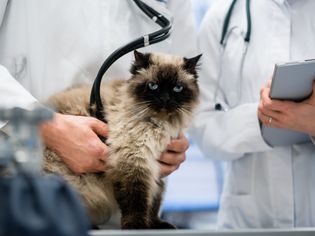Encephalitis in cats is a rare but potentially life-threatening disease that results in brain inflammation. The causes of encephalitis are not entirely clear but can be linked to various infections and autoimmune disorders. Encephalitis symptoms include seizures, behavioral changes, and pupillary abnormality. Encephalitis in cats shares symptoms with many other neurological conditions, so pay a visit to your vet for a proper diagnosis. Treatment and prognosis for encephalitis in cats depend heavily on the suspected cause of the inflammation. Cats with less severe cases can respond well to treatment, while others have irreversible brain damage.
What Is Encephalitis?
Encephalitis is the inflammation of the brain. The condition can occur by itself but often in conjunction with other neurological illnesses such as myelitis (inflammation of the spinal cord) and meningitis (inflammation of spinal cord membranes). Encephalitis is rare in cats but can be life-threatening if it isn't treated promptly.
Symptoms of Encephalitis in Cats
Encephalitis causes symptoms that overlap with many neurological conditions. If you notice your cat behaving abnormally or feeling sick, pay a visit to your vet for a definitive diagnosis.
Fever
Brain inflammation from encephalitis can lead to fever. If your cat develops a fever for any reason, visit your vet.
Seizure
Encephalitis can cause seizures in cats. Seizures can consist of twitching, drooling, motionless staring, excessive swallowing, and vocalization. Episodes usually last for a few seconds to a minute.
Behavioral Changes
Behavioral changes such as non-responsiveness and depression can be seen in cats with encephalitis. Any neurological illness can prompt your cat to act strangely, for example, refusing to use its litter box or altering the way it interacts with its owners.
Head Tilt
A head tilt to either side can be symptomatic of encephalitis in cats. This could be because of the way brain inflammation is impacting your cat's spine.
Facial Paralysis
Facial paralysis in a cat may indicate encephalitis. Sometimes, paralysis can affect a cat's limbs as well.
Pupil Abnormality
Encephalitis can affect the appearance of a cat's pupils. This can look like small, pinpoint pupils or pupils of different sizes. Your cat's eyes might also become less responsive to light.
Causes of Encephalitis
There are several suspected causes of encephalitis in cats but no definitive explanation. Encephalitis can occur without any prior illness or pathogen exposure.
- Infections: Many infections are related to the development of encephalitis in cats. A bacterial or viral infection, such as feline Immunodeficiency Syndrome (FIV), feline infectious peritonitis (FIP), or even rabies, can cause encephalitis. Conditions like toxoplasmosis, caused by the protozoan parasite Toxoplasma gondii, may lead to encephalitis.
- Immune disorders: Immune disorders in cats can lead to encephalitis. If your cat has an autoimmune disease, its brain can attack itself, leading to inflammation.
- Fungus: Fungal infections, such as those caused by Cryptococcus neoformans and Blastomyces dermatitidis have been linked to encephalitis in cats.
Diagnosing Encephalitis in Cats
To diagnose your cat with encephalitis, your vet will perform a full physical examination, including neurological tests such as an EEG (electroencephalography). Physical and neurological tests will often be accompanied by blood work, urinalysis, and a sample collection of your cat's cerebrospinal fluid. A blood test will help your vet identify bacterial or viral infections that may be contributing to the cause of encephalitis. Your vet will also examine possible non-inflammatory causes for your cat's seizures and explore an epilepsy diagnosis.
Treatment
Your vet's first priority will be to decrease the swelling in your cat's brain and stop any seizures. Once your cat has been diagnosed with encephalitis, your vet will likely prescribe an antibiotic, antiviral, anticonvulsant, or antifungal depending on the suspected cause of the inflammation. If your cat tests negative for all infectious diseases, your vet may prescribe medications to suppress its immune system. This treatment will usually last between three and six months and can involve chemotherapy.
Prognosis for Cats With Encephalitis
The prognosis and speed of recovery from encephalitis will depend on what's causing your cat's inflammation and the severity of its condition. Sometimes, brain inflammation can cause irreversible damage to a cat's nervous system.
How to Prevent Encephalitis
The only way to prevent encephalitis in cats is to limit your cat's exposure to infections that may contribute to the development of the disease.
- Is encephalitis the cause of my cat's seizures?
Encephalitis can cause seizures in cats, but visit your vet to rule out other seizure-causing neurological conditions. You may find that your cat has an epilepsy disorder without encephalitis.
Can encephalitis be treated?Depending on the cause of your cat's encephalitis, treatment can be successful. Severe cases are much harder to treat.
What kinds of tests will my cat need for an encephalitis diagnosis?To diagnose your cat with encephalitis, your vet may need to run tests such as an MRI, CT scan, EEG, urinalysis, blood work, and spinal fluid extraction.
If you suspect your pet is sick, call your vet immediately. For health-related questions, always consult your veterinarian, as they have examined your pet, know the pet's health history, and can make the best recommendations for your pet.Related Article
 cat-basic-training
cat-basic-trainingTraining Your Fearful Cat to Be Confident
Working with fearful cats can be a challenge because people often confuse their behavior with aggre
 cat-behavior-problems
cat-behavior-problemsWhy Does My Kitten Bite Me? How to Stop Biting and Scratching in Kittens
Why does my kitten bite me? Kittens often bite while they're playing and become overexcited. This i
 cat-nutrition-and-food
cat-nutrition-and-foodWhat You Need to Know About Homemade Cat Food
Pet parents may consider home cooking for their pets for many different reasons. This may include
 cat-nutrition-and-food
cat-nutrition-and-foodIs Basil Safe for Cats?
Basil is one of the more commonly used and grown herbs in American homes. It’s used not just in a
 cat-parasites
cat-parasitesRoundworms in Cats
There are two species of roundworms that infect cats; Toxocara cati and Toxascara leonina. Th
 cat-preventative-care
cat-preventative-careMange in Cats
Mange in cats is a skin disease caused by parasitic mites, which are tiny arachnids related to spid
 cat-treatments
cat-treatmentsWhat to Do if a Scorpion Stings Your Cat
There are a number of scorpions in the world, many of which can be found in North America. Scorpion
 short-haired-cat-breeds
short-haired-cat-breedsKorat: Cat Breed Profile, Characteristics & Care
The Korat, also known as the Si-Sawat, is a stunning cat breed that originated in Thailand over 900
About FleaFree Feline
We are a premier digital platform committed to delivering high-quality content to our readers. Our mission is to provide accurate, reliable, and engaging information that adds value to our audience's daily lives.
Our team consists of experienced content creators and subject matter experts who uphold the highest standards of professionalism. In an era of information overload, we curate content with care, ensuring our users receive only the most relevant and trustworthy information.
Beyond just reporting facts, we focus on depth and context. Through expert analysis, comprehensive research, and clear presentation, we help our audience gain meaningful insights and make informed decisions.
We take pride in being a trusted information source for our growing community of readers. Our user-first approach means we continuously adapt to provide content that meets our audience's evolving needs and interests.
Innovation and excellence drive everything we do. We're committed to improving our platform and services to deliver the best possible experience for our users.










Comments on " Encephalitis in Cats" :